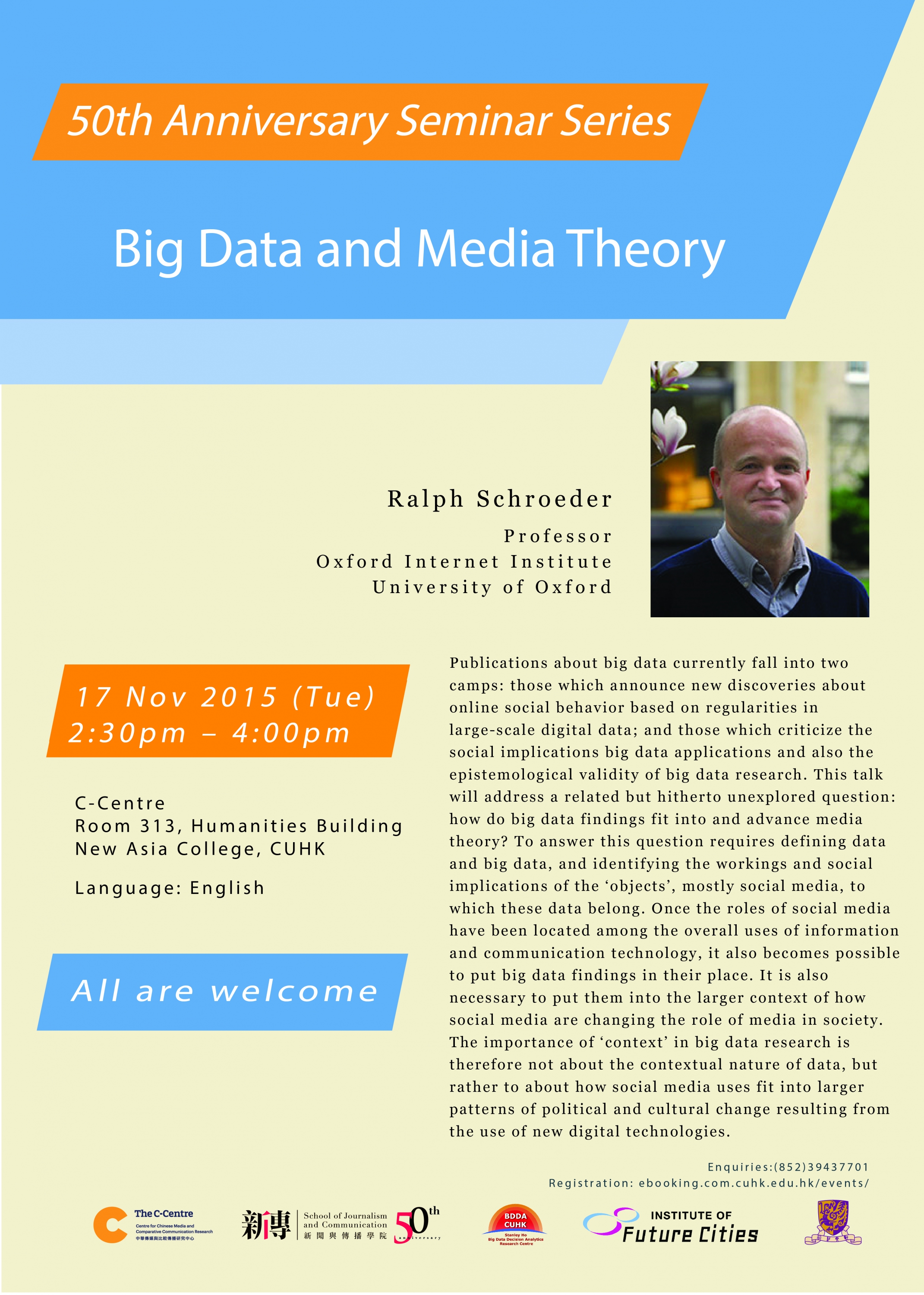Events
Big Data and Media Theory: Seminar by Prof. Ralph Schroeder
17 Nov 2015
2:30pm – 4:00pm
NAH313 (C-Centre)
Prof. Ralph Schroeder
Ralph Schroeder is Professor and director of the Master’s degree in Social Science of the Internet at the Oxford Internet Institute. Before coming to Oxford University, he was Professor in the School of Technology Management and Economics at Chalmers University in Gothenburg (Sweden). His recent books are Rethinking Science, Technology and Social Change (Stanford University Press, 2007) and, co-authored with Eric T. Meyer, Knowledge Machines: Digital Transformations of the Sciences and Humanities (MIT Press 2015). He is the author of six books, editor and co-editor of four volumes, and has published more than 125 papers on virtual environments, Max Weber, sociology of science and technology, e-Research and other topics. Recent projects have focused on big data, including ‘Accessing and Using Big Data to Advance Social Science Knowledge’ (2012-2014), funded by the Sloan Foundation, and ‘Data-driven Approaches to Evidence-informed Policymaking’ for the European Commission (2015).
For registration, please visit http://ebooking.com.cuhk.edu.hk/events/
manlokchan@cuhk.edu.hk
Prof. Ralph Schroeder will give a public talk on the topic of Big Data and Media Theory
Date: Tuesday, 17 November 2015
Time: 2:30pm – 4:00pm
Venue: Room 313, Humanities Building, New Asia College, CUHK
Speaker: Ralph Schroeder, Professor, Oxford Internet Institute, University of Oxford
Language: English
Synopsis: Publications about big data currently fall into two camps: on the one hand are those which announce new discoveries about online social behaviour based on regularities in large-scale digital data. On the other hand, there are those which criticize the social implications big data applications and also the epistemological validity of big data research. This talk will address a related but hitherto unexplored question: how do big data findings fit into and advance media theory? To answer this question requires defining data and big data, and identifying the workings and social implications of the ‘objects’, mostly social media, to which these data belong. Once the roles of social media have been located among the overall uses of information and communication technology, it is also becomes possible to put big data findings in their place: Examples include how Wikipedia provides a popular source of information, how Twitter mobilizes political protest, and the correspondence between online and offline characteristics of Facebook users. While these examples provide interesting new findings, it is necessary to put them into the larger context of how social media are changing the role of media in society: for example, do social media change the agenda-setting process compared to traditional media? How do social media add to the maintenance of interpersonal ties in everyday life? The importance of ‘context’ in big data research is therefore not about the contextual nature of data, but rather to about how social media uses fit into larger patterns of political and cultural change resulting from the use of new digital technologies. Data-driven discoveries do not advance social science knowledge in a vacuum. Nor are they constrained by epistemological conundrums. But they can only promote social science if they are shown to contribute to how we make sense of the main objects from which we derive big data.


